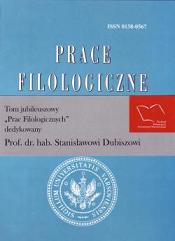Общая характеристика ономастики ромашканского ареала
A General Overview of the Onomastics of Ramaškonys Micro-Area
Author(s): Nijolė TuomienėSubject(s): Language and Literature Studies
Published by: Wydział Polonistyki Uniwersytetu Warszawskiego
Keywords: onomastyka; Białoruś; gwara litewska; onomastics; Belarus; Lithuanian dialect
Summary/Abstract: The paper sets out to describe the general features of present-day onomastics and the relationship between official and local name forms as well as their usage patterns in Peregancy and its environs (district of Voronovo, Belarus). The history of sociolinguistics of the area under investigation and the present sociolinguistic situation has made major influence on the development of the onomastics of the region, its present situation and functioning. The names of villages, personal names and surnames in all official documents are given exclusively in Russian. Therefore, the Russian form of a variety of names is the only official form, which is far from the actual language spoken in the area. In speech, preference is given to the Byelorussian variety of all names; it is the main variety on a large part of Voronovo territory. In villages which have preserved the Lithuanian language, the names of villages and the population still have their Lithuanian variety, which is also well-preserved outside the Lithuanian dialect. The history of the region has given rise to the third, Polish, variety of names. It is mainly used by those who have attended Polish schools. Thus, all four forms of the same name have certain differences in pronunciation, stress and word-formation pattern. The majority of villages have their names of the Baltic origin. Part of them have acquired Slavic features. A large number of surnames have been derived on the basis of the Lithuanian appellative. Lithuanian place-names have been preserved even in villages which lost their Lithuanian language tradition 60-80 years ago. The official version of personal names and surnames are written exclusively in Russian. They were derived on the basis of the local Byelorussian dialect and the Polish language. The investigation of onomastics helps us understand the mechanism of interaction between languages and dialects; gives insights into the peculiarities of language development and change.
Journal: Prace Filologiczne
- Issue Year: 2007
- Issue No: 53
- Page Range: 645-664
- Page Count: 20
- Language: Russian

